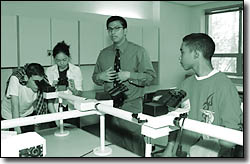Medical School Sponsors High School Science Competition

“If you have ever experienced intolerable delays downloading a program or page, you understand the pitfalls of Internet congestion,” said Nathaniel Duca before a panel of science judges at the Medical School (HMS), sounding more like a new economy devotee at an upstart “dot.com” than a teen competing at a regional science fair.
The event, the Southern New England Regional Junior Science and Humanities Symposium (JSHS), has been sponsored by the Medical Schools Minority Faculty Development for the past four years.
Duca was one of 10 outstanding high school students from southern Massachusetts and Rhode Island who came to HMS vying for an opportunity to compete for the National Junior Science and Humanities Symposium title in Washington, D.C., later this year. These 10 students were chosen after judges from HMS reviewed 42 submitted abstracts. An additional 24 students were invited to prepare poster presentations.
The young scientists selected to participate in the competition defended their papers at an academic level reminiscent of a doctoral dissertation defence. And the topics, which ranged from firefighting robots to the long telomeres in the Galapagos tortoise, appeared suitable for federal research grants.
At each of the 48 Regional Symposia across the country, a winner receives a scholarship award and, with four other finalists, is invited to present his or her research at the National Symposium. More than 10,000 students and teachers participated in the JSHS regional two-day events this year.
“Two hundred students and teachers, representing 33 area high schools participated this year at our Regional Symposium,” said Joan Reede, associate dean for faculty development and diversity. “Our program offers participants the opportunity to tour research laboratories and be exposed to various clinical settings at the Harvard teaching hospitals.”
Ducas solution to Internet congestion a methodology to monitor Internet performance on a global scale to pre empt performance crises scored well with the faculty panel from the University, Medical School, School of Public Health, and area high schools, who awarded the high school senior first-place honors. The award includes a $4,000 scholarship and the opportunity to compete for the national title.
One of the students participating in this years competition, Laura Martin, was a past member of Project Success, an additional program sponsored by the HMS Minority Faculty Development Program that offers qualified students living in Cambridge or Boston an eight-week paid summer research position at HMS or an affiliated institution. Since the pilot program was launched in 1993, Project Success students have matriculated at such colleges as Harvard, the Massachusetts Institute of Technology, Wellesley, Smith, Dartmouth, and Yale, among others.
“For children to become the next great clinicians or research scientists, the communities they live in need to inspire them,” said Reede. “Thats what our programs strive for. And in return, these kids inspire us.”
Carole Teperow is a member of the Faculty Development and Diversity Office at Harvard Medical School.




